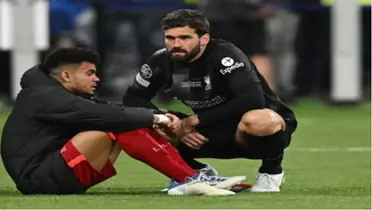Warning lights, Liverpool the possible next victim of Financial Fair Play
Liverpool has plenty of FFP headroom, but it will need to be aware of changing regulations.

Chelsea, on the other hand, looks set to be completely immune. There has been huge amounts of chatter about Financial Fair Play over the last week or two. The Premier League must be kicking itself for bad branding. The division’s rules aren’t in fact known by the snappy FFP moniker at all. Liverpool watched on as its near-neighbor and Nottingham Forest were actually charged with Profitability and Sustainability (PSR) breaches, far more of a mouthful than the UEFA equivalent.
Kylian Mbappé's admiration for LeBron James could ensure the Frenchman's arrival
Yet while the name might not be so catchy, the Premier League is showing that its regulations arguably have more teeth, even if many were anticipating Chelsea might be charged after an unprecedented spending spree. FSG, Liverpool’s owners, have long since hoped for a real regulation system, and there’s a perception that UEFA never really delivered that with FFP.
Of course, it attempted to ban Manchester City from all European competition for two seasons, but saw that overturned by a 2-1 majority at CAS. Interestingly, there is a requirement within Premier League rules to comply with UEFA’s FFP regulations, and that forms part of the 115 charges that the independent commission will hear. Liverpool and indeed all of Manchester City’s league rivals will obviously watch the outcome of that case, whenever it comes, with huge interest. Meanwhile, however, UEFA rules are changing.
In fact, we’re technically already in a post-FFP era. No doubt UEFA’s financial rules will continue to be colloquially referred to as such, but as of last season the Financial Sustainability and Club Licensing Regulations (FSCLRs) are in play. Aside from making the Premier League’s PSR look like a branding masterstroke, what exactly is this successor to FFP? There are a few strands to it. One of those is actually a relaxing of the rules: allowable losses over a three-year period have been doubled, from €30m to €60m.
The high cost of success for Liverpool this season, where glory is the end
The way to reduce debt
A second pillar stamps down on overdue payments of debts. These will now be assessed quarterly, and there will be fixed penalties for non-compliance. But the most interesting new measure is the ‘squad cost rule’. This dictates that clubs in UEFA competition cannot spend more than a certain percentage of their revenue on key playing costs: player and coach wages, transfers and agent fees. For 2023/24, the percentage stands at 90. But Liverpool and other clubs in Europe will need to be on their guard, as this figure is set to drop over the next couple of campaigns. For next season, it will be down at 80 per cent, and will then drop to the final intended number for 2025/26: 70 per cent.
More news

Details of Alexander-Arnold's multi-million-dollar Real Madrid contract leaked
24/03/2025

Bean Doak, the talent who could facilitate two Liverpool signings
24/03/2025

Virgil Van Dijk says goodbye to Liverpool and has a new destination
24/03/2025

Liverpool raises alarm over Luis Díaz and activates plan: Barcelona would be 'seeing a spark'
23/03/2025

The juicy price Konaté would get for Real Madrid: Liverpool makes it easy
23/03/2025

What's next for Federico Chiesa? Liverpool makes a transfer decision amid the winger's nightmare debut season at Anfield
23/03/2025

Chelsea and Liverpool offer 75 million for the Serie A jewel
23/03/2025

Liverpool and Bayern Munich at war over a 21-year-old gem
23/03/2025

Salah and his Liverpool contract renewal: from imminent departure to unexpected surprise
22/03/2025

In full: Watch Liverpool FC Legends' 2-0 win over Chelsea Legends
22/03/2025

Steven Gerrard makes Liverpool Premier League title claim and pays tribute to Reds hero
22/03/2025

He's a Liverpool star and is hooked on one of the best Pokémon games ever
21/03/2025

Liverpool suffer major new injury concern as defender axed from squad
21/03/2025

Van Dijk leaves Liverpool: four possible destinations
21/03/2025

Liverpool finds replacement for Van Dijk in Serie A
21/03/2025

Luis Díaz revealed his dream team with Messi, Iniesta, and Puyol: a nod to Barça?
20/03/2025

Alisson praised Luis Díaz just hours before Brazil vs. Colombia: "He's outstanding."
20/03/2025

The 5 most realistic replacements for Virgil Van Dijk at Liverpool - ranked
20/03/2025



